Today, I'll be revisiting my list of my top fifty favorite movies. For this installment, I'll count down from 20 to 11.
Criteria:
Personal opinion
No TV movies or miniseries
I am able to collect an entire series or trilogy into a single spot
20.
Donnie Darko: Richard Kelly's dark and complicated science-fiction/horror drama boasts an impressive all-star cast and focuses on the exploits of a very troubled high-schooler by the name of Donnie Darko, who must deal with his psychological issues, hallucinations of a doomsday-prophesizing man in a uniquely terrifying bunny costume, his dysfunctional family, his morally bankrupt suburban community, and the possibility that time travel may exist. Jake Gyllenhaal is one of the younger actors in this movie and also delivers it's most nuanced and challenging performance, foreshadowing his career of consistently excellent performances. His real-life sister Maggie Gyllenhaal portrays his bitchy and whiny sister in this film, and the rest of the cast includes the film's executive producer Drew Barrymore, Patrick Swayze, Jena Malone, Daveigh Chase (
Big Love, Lilo & Stitch, Spirited Away, The Ring), James Duval, musician Alex Greenwald, and a young Seth Rogen and Ashley Tisdale. All those big names for a low-budget movie that performed poorly at the box office and developed a cult following. However, the film was positively reviewed, which has since contributed to it's growing fan base. I remember the first time I saw this film, and I was pleasantly surprised by it's weird atmosphere and quirky characters, as well as it's brilliant writing and haunting soundtrack, featuring an ominous main theme by Michael Andrews and Gary Jules' depressing but memorable "Mad World". It gets better with more viewings, and I have yet to view the praised director's cut, but I intend too as soon as possible.
Donnie Darko isn't for everyone, but even if you don't like it, you have to give it credit for it's original plot and interesting characters, in addition to it's unique blend of genres (sci-fi, fantasy, horror, drama, high school movie, dark comedy, etc.) and haunting & ominous tone and atmosphere.

19.
Happiness: Todd Solondz's extremely dark and uncomfortable black comedy/satire is something that most people will probably find hard to stomach. A compelling and startlingly original and sometimes pessimistic view of life, the film tracks the lives of three sisters and their family and friends. One sister is unwittingly married to a pedophile who fruitlessly tries to control his horrible urges; another has an incredibly hard time trying to find the right man; and the third lives a few doors down from a perverted man who can only masturbate when making crass and obscene prank calls to women. Their parents are starting to drift apart in their old age after 40 years of marriage, and the son of the first sister and the pederast is confused and intrigued by his pubescent sexual urges. With a plot like that, it's easy to see why many find this one a little too off-beat and weird for their tastes. However, I found it to be an extremely enjoyable film, despite all it's horrible plot lines and pretty depressing and bleak ending that betrays it's title. It's got a cool visual style, and all the characters are richly written, despite them not exactly being "realistic". When I say that, I mean that this film exists in a sort of alternate, hyper-reality where everyone is just a little strange or "off" compared to people you'd meet on a day-to-day basis; and the fact that the family is this dysfunctional and has this many issues makes me wonder how they kept it together up until this point. The film's cast is also incredible: Jane Adams, Dylan Baker, Elizabeth Ashley, Lara Flynn Boyle, Phillip Seymour Hoffman, Jared Harris, and Jon Lovitz are all fairly big names, and all do really great jobs, especially Baker, Hoffman, and Lovitz. Baker's performance is incredibly creepy and unsettling, even for a black comedy/drama, and also a little pathetic. I almost felt pity for him for how fucked up his life has become, but that pity reached it's limits when he (Spoiler) tearfully admits to his son that he wouldn't molest him, but "jerk off instead". That was my breaking point with this character, he crossed the point of no return as far as unsympathetic goes. Hoffman is also very weird, but not in that way, he's just kind of an odd, soft-spoken pervert. Hoffman is able to convey a lot without saying a lot, and comes off as the most awkward, pathetic guy on earth, but is also able to find a strange sort of happiness near the end, which is quickly crushes by a startling revelation. Anyway,
Happiness is definitely not the type of movie you want to watch if you're in the mood for an uplifting or lighthearted film, but if you like bleak and kind of quirky black comedies, or are a fan of Todd Solondz, than this movie is definitely for you, I know I loved it.

18.
E.T., The Extra Terrestrial and
Jurassic Park (tie): Both are Steven Spielberg films, and each is considered a classic in it's own right.
The first is unbelievably sappy and cheesy when you think about it, but I really can't help but like it because it's one of those movies that's timeless and will always hold a special spot in my heart. The special effects are extremely good for the early 80's and the relationship between Elliot and the alien is actually pretty touching. The main theme is also extremely memorable and iconic, as is the shot of E.T. and Elliot flying on a bike past the full moon.
The second is the darker and more violent but still successful and beloved
Jurassic Park, based on Michael Crichton's bestseller. The CGI and animatronics are still awe-inspiring today, as shown by the ticket sales on the 3D re-release. John Williams' amazing musical score is iconic and induces extreme nostalgia. The action is exciting and the dinosaurs can actually be terrifyingly realistic (especially those velociraptors, who are regarded as some of the scariest creatures in any movie). And also: it's dinosaurs. It's fucking dinosaurs. And who is fascinated or at least intrigued by those? Both these movies deliver timeless stories, and have a visionary and experienced director behind them to bring those stories to life convincingly.

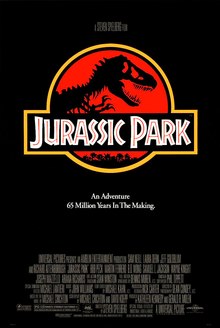
17.
American Psycho: Mary Harron's scary and polished psychological thriller/horror film/black comedy is a fascinating character piece on one Patrick Bateman (Christian Bale, who delivers what is arguably his best performance in any movie), a Wall Street banker who has everything: equally shallow, pretentious, and narcissistic friends and coworkers; an extravagant lifestyle; more money than he can spend; and all the cocaine he can snort and hard alcohol he can consume. But what he really loves more than anything in the world: killing random people, or those who are more wealthy and tasteful than he is. This movie, like
Trainspotting before it, starts off as an extremely black comedy, but slowly progresses to a point where it's more of a straightforward psychological drama. Bale tackles an incredibly challenging character: Bateman constantly switches from over-the-top and goofy, to suave and sophisticated, to openly narcissistic and self-absorbed, to whimpering idiot, to terrifying serial killer. Every scene he's in is tense, as anything sets him off: from something as hurtful as someone unknowingly insulting him to his face, to something as trivial and vain as someone having a slightly better business card than him. The rest of the cast are excellent as well, the lineup consisting of Willem Dafoe, Jared Leto, Josh Lucas, Chloe Sevigny, Cara Seymour, Reese Witherspoon, Justin Theroux, Guinevere Turner, Matt Ross, and others. Mary Harron's direction and writing (the latter with Guinevere Turner) is excellent for a relatively unknown director and screenwriter (she is seriously underrated), and the cinematography is gorgeous. I've never read Bret Easton Ellis' satirical novel, but I plan to, and I've heard that the film tops the book in some ways, and captures the tone perfectly. The mind-bending and bleak ending is fantastic, and Bateman's ending monologue is expertly written by Harron and Turner and convincingly delivered by Bale. The ending is brilliant, bold, and risky, as it could have left audience members disappointed and confused. Luckily, most people got it: it's supposed to leave the audience as conflicted and confused about Bateman as he is about himself, and shows how the world Bateman inhabits is so shallow and vapid that he will continually evade justice even if he confesses his countless crimes directly to a lawyer (who mistakes his confession for a joke, and doesn't even recognize Bateman). The ending is also terrifyingly unclear: is Bateman a ruthless serial killer who will constantly get away with it, or is he a schizophrenic who has imagined these crimes with such vivid detail that he has begun to believe his own fantasies have come to pass? Either way you look at it, it's creepy and leaves you in a state of uncertainty, which I think unsettles many people, as we as a species always want to find the answers to things that are unknown, or find a motive behind a crime, and the fact that the crimes we have seen may never be resolved (and may have not even happened) scares people. That's what makes this film a real horror story despite all the black humor, and it's also this complexity and richness that makes me love this movie the more I watch it.

16.
The Departed: Martin Scorsese's complicated and violent thriller is a remake of the equally entertaining Hong Kong crime film
Infernal Affairs. It follows the stories of two moles: the first, Billy Costigan, is a young man from an infamous criminal family in Boston. Unbeknownst to his friends, Costigan is an off-the-record informant for the police department, embedded deep inside ruthless Irish mafia boss Frank Costello's criminal empire. The second is Colin Sullivan, a staff sergeant in the Massachusetts State Police. He's clean-cut, friendly, and trustworthy. Little do any of his coworkers know, he is a mole for Costello's organization, and has been trained for his occupation since he was a kid. Everything is going smoothly for the first few months, but as time goes on, the inevitable crossing of paths occurs, and as things get more tense and both moles' lives begin to unravel, they begin to question their loyalties and try to survive and hide their true identities from their respective bosses. The film is obviously different than the original Hong Kong version, but from what I've heard it's actually one of the better Americanizations of an Asian film. The film has an amazing cast, featuring Matt Damon and Leonardo DiCaprio, who both give two of their best performances. DiCaprio is the more sympathetic of the two as Costigan, and he pulls off the leading man roles really well. Damon may also be a leading man, but as
The Talented Mr. Ripley showcased, he can play a great villain, so his cutthroat portrayal of Sullivan is surprising and refreshing. Jack Nicholson is fantastic as Frank Costello, who is basically just a more sinister version of Nicholson. As much as I love and admire Nicholson, I will admit many of his performances are just different shades of Jack Nicholson. Here is no different, but that doesn't make it a bad performance. In fact, this character is strong because he is just as charismatic and weird as Nicholson himself is. Martin Sheen plays his opposite: the police captain Queenan. Where Costello is corrupt, Queenan is an upstanding citizen; where Costello is a cold-blooded killer, Queenan is very peaceful; where Costello is psychotic and unstable, Queenan is calm and collected; where Costello mocks religion, Queenan is a Catholic; and has a strong moral code; and where Costello scoffs at any sense of morality or remorse, Queenan is kind and has a strong moral code. Both these men represent one of the film's core themes: the archetypal Irish father figure. Costello is the yin to Queenan's yang, and they both show the two opposite sides of what the stereotypical Irish father figure can be: a caring and morally sound Irish police officer, or a violent and unpredictable Irish criminal. This is also similar to how Sullivan and Costigan, despite both being close to Costello and growing up in the same environment, couldn't be more different. This whole movie is full of overlapping themes like that, making it more than just another Scorsese crime movie. It's a modern masterpiece.
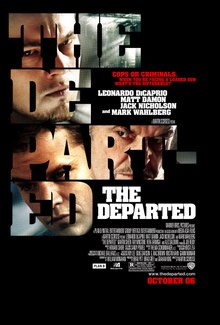
15.
The Shining and
2001: A Space Odyssey (tie): Both of these films are masterpieces, and are made by a man who is universally hailed as one of the best film directors, if not the best film director, of all time: Stanely Kubrick. The former is an adaptation of Stephen King's wildly popular novel
The Shining. Kubrick took the already eerie source material and made it his own, improving upon it and making the ending bleaker and more open to interpretation, something that irritates King to this day. That's right: King hated the adaptation and even had a TV miniseries made in the mid-90's to show the version he wanted, and it was even titled
Stephen King's The Shining. I, like most people, enjoy Kubrick's version better for it's revoltionary cinematography, haunting atmosphere and visuals, excellent score by Walter/Wendy Carlos, iconic performance by Jack Nicholson, and cerebral tone.
The latter is Kubrick's earlier effort: an epic about space, time, and man's evolution, and how they are all tied to a seemingly malevolent and enigmatic alien being, which is in the form of a mysterious black monolith. The soundtrack, beautiful and lush cinematography, iconic moments, terrifyingly cold and calculating computer/villain HAL 9000 (considered one of the great movie villains), and trippy and mind-bending ending are why I love this movie. They make it worth revisiting again and again and also make the viewer think. This is a great example of both arthouse cinema and science fiction movie, and is a great film to analyze, because a lot of it is open to interpretation: a staple of Kubrick's films.
Both these movies exemplify why Kubrick is such a master of the craft: he's a genius with the camera, and he knows exactly how to direct his actors and crew.


14.
Lawrence of Arabia: David Lean's masterful and timeless epic tells the story of T.E. Lawrence, one of the most controversial and psychologically interesting figures in modern history. The cinematography is so beautiful and sweeping, and many of the shots were done without the aid of special effects, and since have not been able to be replicated. Peter O'Toole steals the show in one of his first major film roles. His performance as Lawrence is brilliant and complex, and it also leaves a lot open to interpretation, making it worth several re-watches. Sam Spiegel financed the film, and spared no expense. The budget and cast are both incredibly big, and the action highlight is the spectacular and expensive sequence involving the locomotive crash and raid. Alec Guinness, Anthoyn Quinn, Omar Sharif, and Jack Hawkins all give exceptional supporting performances. Sharif, in particular, stands out as the strongest supporting actor, and at the time was relatively unknown. Maurice Jarre's rousing and iconic musical score is also worth noting, as it has become one of the most recognizable and beloved movie themes of all time. Although the run-time can intimidate many and definitely strain some attentions spans, it's well worth it. It's just one of those movies that will always be considered a masterpiece.

13.
Monty Python and the Holy Grail: A classic spoof film that pokes fun at medieval movies, culture, and people in general, it's sad to see that people these days are so used to films like
A Haunted House and others like it that movies like this, that are absurd but also somehow subtle, go over their heads and they deem them "bad" or "stupid". I know that in my high school history class a while back my classmates did not understand the humor and simply brushed it off as being dumb or unintelligent, which couldn't be farther from the truth. I've now started to leave it out of my list when people ask me what my favorite films are because people (usually) give me funny looks when I say it's one of my favorite comedies. Anyway, the reasons I like it is because it's very quotable, the situations the characters face are purposely odd and confusing, the writing is extremely original, the acting (almost all the characters are portrayed by members of the Python comedy troupe) isn't exactly
great (the actors often chew scenery), but that's actually done on purpose, the animated scenes are iconic and unique, and it's a movie you can still laugh at even if you've seen it a hundred times, because it's so offbeat and unlike anything else that you can't really help but like it.

12.
Willy Wonka and the Chocolate Factory: A timeless movie based on the equally excellent Roald Dahl book, I was surprised to hear that back when it was released, despite positive reception, it did horribly at the box office, but has since become beloved due to home video sales and television airings. Dahl hated the movies (similar to how Stephen King would disown
The Shining ten years later), and the few awards it was nominated for it lost to
Fiddler on the Roof. However, like I said before, it eventually grew on people..a lot, myself included. It's charming, despite all it's 70's strangeness (that psychedelic, bad trip tunnel sequence is infamous for giving kids nightmares), particularly due to Gene Wilder's perfect portrayal of Willy Wonka, appearing eccentric and odd but also somehow wise and kind. Peter Ostrum, in his only movie role, also does a fair job as Charlie. Jack Albertson is great as Charlie's grandpa Joe. This movie may not be for everyone, but it's still leagues above that shit Tim Burton reboot from 2005.
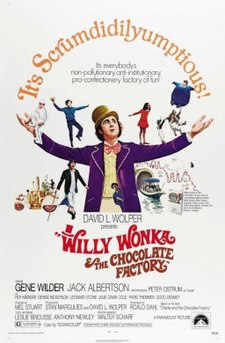
11.
No Country for Old Men: The Coen Brothers' adaptation of Cormac McCarthy's dark and brooding modern western novel takes place in 1980 and follows an average joe and Vietnam vet named Llewelyn Moss, who comes across a drug deal gone wrong in the middle of nowhere. Pretty much everyone is dead, and the drug money is still left over. He decides to take the money, as he and his wife are struggling financially, but this proves to be a terrible decision: he finds himself being tracked down by a local sheriff who's on the brink of retirement, and (even worse) being hunted by Anton Chigurh, an emotionless, extremely skilled hitman who was hired to recover the money. This movie is a dark and thrilling cautionary tale: never get involved in a situation which can lead you to be in over your head. Javier Bardem's chilling and monotone performance as Chigurh earned him an Oscar, BAFTA, and a Golden Globe, among others. This is the role that introduced him to the American moviegoing public, and what an intro it is. Tommy Lee Jones, Josh Brolin, Woody Harrelson, and Kelly Macdonald also go fantastic in this movie. But I think what really makes it is the Coens' superb directing style and darkly comic writing, even though there's not too much comedy in this film. I really enjoy re-watching this movie for the cinematography, acting (particularly from Bardem), writing, and thrilling plot.
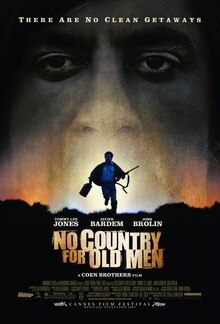
(Images: Wikipedia)
Runner-ups:
Rocky, Ghostbusters, Back to the Future, Spaceballs, Psycho, Saving Private Ryan, Full Metal Jacket, Platoon, Gladiator, Braveheart, Forrest Gump, King Kong, Gojira, Traffic, Goldfinger, Casino Royale, Skyfall, The Borune Supremacy, The Town, Inception, Planet of the Apes, The Trasnformers: The Movie (1986),
Alien, Predator, The Terminator, Robocop, Schindler's List, X-Men, Animal House, Seven, Team America, The Exorcist, The King's Speech, Blue Velvet, Mulholland Drive, Iron Man, The Avengers, The Omen, Rosemary's Baby, Amadeus, Gangs of New York, The Breakfast Club, Scarface, Oldboy, A Nightmare on Elm Street, First Blood, The Boondock Saints.
 (Image: Wikipedia)
(Image: Wikipedia)










 (Images: Wikipedia)
(Images: Wikipedia)
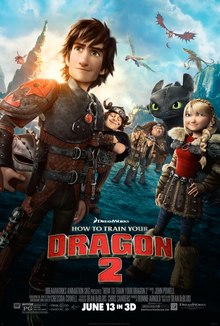 (Images: Wikipedia)
(Images: Wikipedia) (Image: Wikipedia)
(Image: Wikipedia)

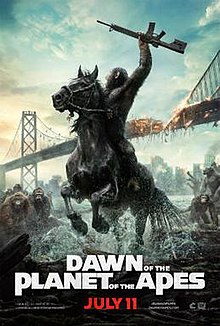 (Images: Wikipedia)
(Images: Wikipedia)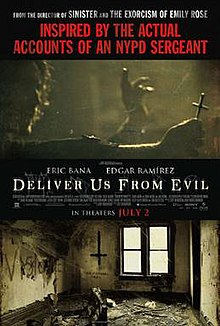 (Image: Wikipedia)
(Image: Wikipedia)
 (Image: Wikipedia)
(Image: Wikipedia)